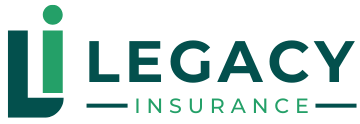When it comes to your healthcare, the right Medicare plan can make a big difference. Many people think that Original Medicare (Parts A and B) covers everything, but it actually leaves out important services like dental, vision, and prescription drugs. That’s why it’s worth exploring Medicare plans with extra benefits to get the coverage you need.
At Legacy Insurance, we help make Medicare simple. Whether you're looking for plans that include wellness programs, over-the-counter allowances, or transportation to medical appointments, we're here to guide you through the options. Choosing the right Medicare plan doesn't have to be confusing—we’ll help you compare top choices so you can find a plan that fits your needs and your budget.
If you're ready to discover a plan that goes beyond basic Medicare coverage, you're in the right place. Learn about different types of plans, what they offer, and how to pick the one that works best for you. You can contact Legacy Insurance for expert help in making your decision.
What Are Medicare Plans with Additional Coverage?
Medicare plans with additional benefits are designed to fill in the gaps left by Original Medicare (Parts A and B). While Original Medicare covers essential hospital and medical services, it doesn’t include many routine or preventive care services that are crucial for overall well-being. That’s where enhanced plans come in—offering more complete healthcare solutions for your evolving needs.
These expanded plans typically offer coverage for:
- Dental services – including regular checkups, cleanings, fillings, dentures, and more complex procedures like root canals or crowns, which are essential for maintaining oral health.
- Vision care – covering eye exams, prescription glasses, contact lenses, and sometimes even corrective procedures, helping you maintain healthy eyesight as you age.
- Hearing benefits – including hearing exams, diagnostic testing, and hearing aid devices, which are important for communication and quality of life.
- Prescription drug coverage – either through standalone Part D plans or integrated with other plans, helping reduce the cost of daily medications and long-term prescriptions.
- Fitness and wellness programs – such as SilverSneakers or similar, offering gym memberships, health classes, and wellness coaching to encourage physical activity and healthier lifestyles.
- Over-the-counter (OTC) allowances – providing monthly or quarterly credits to purchase health items like cold medications, vitamins, first-aid supplies, and other essentials at participating retailers.
- Transportation support – helping you get to and from medical appointments, especially useful for individuals with limited mobility or no access to a personal vehicle.
These benefits are especially helpful for retirees and seniors aiming to stay proactive about their health while managing healthcare costs.

Top Medicare Plans Offering Expanded Coverage
1. Medicare Advantage Plans (Part C)
Medicare Advantage Plans are private insurance alternatives to Original Medicare that combine Part A (hospital insurance) and Part B (medical insurance) into a single plan. Most Medicare Advantage plans go a step further by including Part D (prescription drug coverage) and additional benefits not available through Original Medicare.
Key features often include:
- Dental, vision, and hearing coverage
- Prescription drug plans built into the policy
- Preventive and wellness programs
- Transportation to appointments and post-discharge meal delivery
- Telehealth services and 24/7 nurse hotlines
These plans often have an annual out-of-pocket maximum, which Original Medicare lacks—providing financial protection against high medical costs. However, provider networks can be limited, so it's essential to ensure your doctors and pharmacies are in-network.
Compare Medicare Advantage plans at Medicare.gov
2. Medicare Part D (Prescription Drug Plans)
Medicare Part D is a standalone plan that helps cover the cost of prescription medications. This plan works alongside Original Medicare and is also included in many Medicare Advantage plans.
Important things to know:
- Each plan has a formulary, or list of covered drugs, which varies by provider.
- Plans may offer tiered pricing based on generic vs. brand-name medications.
- Preferred pharmacies may offer lower copays, so choosing the right network can save you money.
If you take regular prescriptions, a Part D plan can offer substantial savings and help avoid unexpected costs.
3. Special Needs Plans (SNPs)
Special Needs Plans (SNPs) are specialized Medicare Advantage plans tailored for individuals with specific health conditions, institutional needs, or low-income qualifications.
Types of SNPs include:
- Chronic Condition SNPs (C-SNPs) – for individuals with ongoing illnesses like diabetes, heart disease, or chronic lung disorders.
- Dual-Eligible SNPs (D-SNPs) – for those eligible for both Medicare and Medicaid, offering coordinated care and extra support services.
- Institutional SNPs (I-SNPs) – for individuals living in long-term care facilities or needing nursing care at home.
SNPs provide focused care management, tailored provider networks, and often include expanded prescription drug coverage and preventive services.
4. Medigap (Medicare Supplement Insurance)
Medigap, also known as Medicare Supplement Insurance, is available to individuals enrolled in Original Medicare. These plans help pay for out-of-pocket costs that Original Medicare doesn’t cover—such as:
- Deductibles
- Copayments
- Coinsurance
- Emergency care during foreign travel (in some plans)
Unlike Medicare Advantage, Medigap plans don’t include extra benefits like dental or vision. However, they’re valuable for those who want predictable costs and flexibility in choosing any provider who accepts Medicare nationwide.
Keep in mind, Medigap and Medicare Advantage cannot be used together. You'll need to decide which path fits your financial and healthcare needs better.

How to Choose the Right Medicare Plan with Extra Benefits
Finding the right plan starts with understanding what’s important to you. Here are a few key questions to consider:
- Do you need extra coverage? – Think about whether dental, vision, hearing, or OTC allowances would improve your quality of life.
- Are your medications covered? – Check the plan’s formulary to make sure your current prescriptions are included and affordable.
- Can you afford the plan’s costs? – Compare monthly premiums, annual deductibles, copayments, and the maximum out-of-pocket limit.
- Is your doctor in-network? – If you have a preferred physician or specialist, confirm they're part of the plan’s provider network.
- Are lifestyle perks valuable to you? – Some plans include wellness benefits like gym access, transportation services, and even grocery delivery after hospital stays.
If you're still unsure, working with a knowledgeable Medicare advisor can help simplify your decision. At Legacy Insurance, we take the time to understand your situation and help you select a plan tailored to your health, lifestyle, and budget.
Find the Medicare Plan That Truly Works for You
Choosing a Medicare plan with extra benefits can make your healthcare experience more complete and affordable. Medicare Advantage plans provide the broadest range of benefits, but it’s important to compare different options based on what matters most to you.
Still unsure? Let Legacy Insurance help. Our licensed advisors specialize in simplifying Medicare and helping you find coverage that meets your personal healthcare needs.
Contact us today to get expert help in choosing the right Medicare plan—with the benefits you really care about.
FAQ’s
1. What are Medicare plans with extra benefits?
These are Medicare plans—usually Medicare Advantage (Part C)—that include services not covered by Original Medicare, such as dental, vision, hearing, prescription drug coverage, fitness programs, transportation, and over-the-counter allowances.
2. Do Medicare Advantage plans cover dental and vision?
Yes, most Medicare Advantage plans offer dental and vision coverage. This can include routine checkups, cleanings, eye exams, glasses, and even hearing aids—services not covered by Original Medicare.
3. Can I get prescription drug coverage with Medicare?
Yes, through either a standalone Part D plan or a Medicare Advantage plan that includes drug coverage. These plans help reduce your out-of-pocket costs for medications.
4. How do I know which Medicare plan is best for me?
It depends on your healthcare needs, medications, preferred doctors, and budget. Use Medicare’s Plan Finder to compare coverage, costs, and included benefits. A licensed advisor can also help you choose.
5. When can I change my Medicare plan?
You can make changes during the Annual Enrollment Period (Oct 15 – Dec 7) or the Medicare Advantage Open Enrollment Period (Jan 1 – Mar 31). Special Enrollment Periods may apply in certain situations like moving or losing other coverage.
6. Are there Medicare plans with $0 monthly premiums?
Yes, some Medicare Advantage plans offer $0 premiums, but you may still pay copays, coinsurance, and your Part B premium. Always check the total out-of-pocket costs, not just the premium.
7. Can I use my own doctor with Medicare Advantage?
It depends on the plan’s provider network. Some plans (like HMOs) require you to use in-network doctors, while others (like PPOs) allow more flexibility. Check if your doctor is included before enrolling.
8. Does Medicare cover gym memberships or fitness programs?
Many Medicare Advantage plans offer free access to fitness programs like SilverSneakers, which includes gym memberships, classes, and online workouts.
9. What’s the difference between Medicare Advantage and Medigap?
Medicare Advantage replaces Original Medicare and often adds extra benefits. Medigap (Medicare Supplement) works with Original Medicare to cover out-of-pocket costs like copays and deductibles but doesn’t include extra services like dental or vision.
10. Do I need both Part D and Medicare Advantage?
No—if your Medicare Advantage plan includes drug coverage, you don’t need a separate Part D plan. If not, you’ll need to enroll in a standalone Part D plan to get prescription drug coverage.

